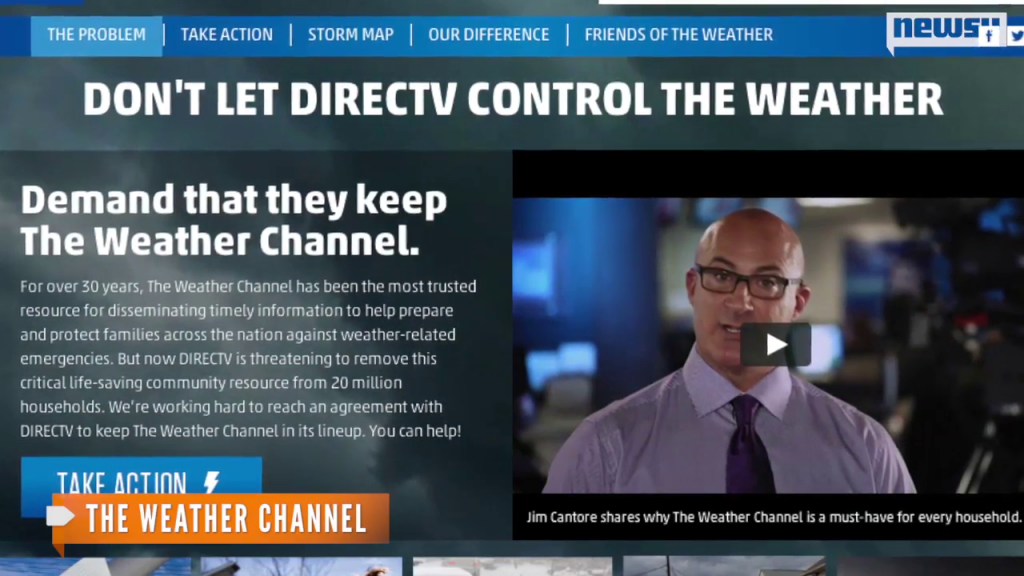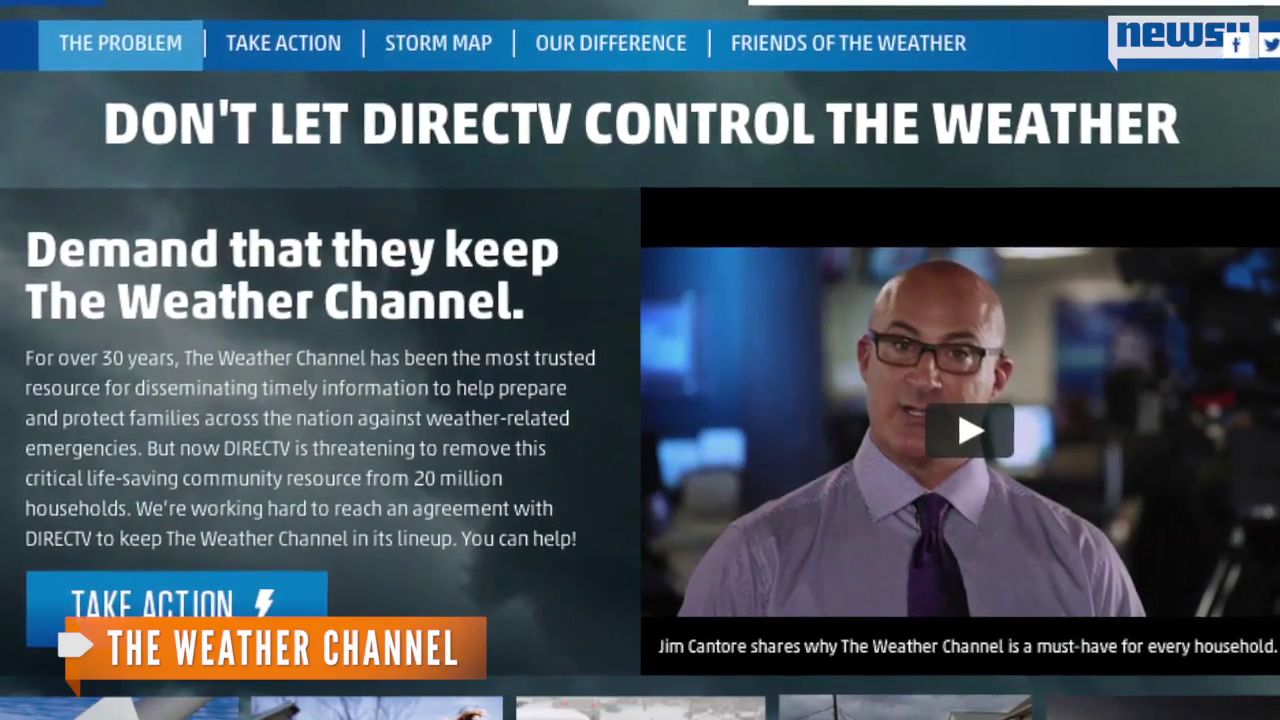By: Bert Thompson

Jim Cantore is the undisputed face of The Weather Channel, and he is everywhere major storms hit: Tuscaloosa, Ala., during the deadly 2011 tornados; New Orleans during Hurricane Katrina; and Superstorm Sandy in the Northeast. But for now, Mr. Cantore is somewhere new: on The Weather Channel’s website imploring viewers to support The Weather Channel’s fight with DirecTV.
In recent weeks, The Weather Channel and the major cable provider DirecTV have found themselves battling not the elements, but each other. The fight reflects the changing environment of cable TV and, more specifically, weather-related content. Their spat isn’t anything minor – shortly after midnight on Tuesday, Jan. 14, DirecTV officially dropped the Weather Channel. This has resulted in the Weather Channel being pulled from one-sixth of American households.
The heart of the disagreement between the companies concerns money and The Weather Channel’s choice of programming. The channel was asking for an increase in how much money it made; however, DirecTV wanted to pay less for the weather and other weather-related reality content. Under the old agreement, The Weather Channel made roughly 13 cents per DirecTV customer in retransmission fees. Now, it is asking for one penny more per month, per subscriber. DirecTV maintains that the company is demanding more than that, and it sees no need to pay The Weather Channel more for their service.
The changing climate of business has The Weather Channel taking a new look at what programming it airs, a move that is transforming them into a reality TV channel. DirecTV – rightfully so – does not see why it should be forced to pay more for a station that airs programming such as “Freaks of Nature” or “Prospectors,” a program detailing attempts to find gold and gemstones. The Weather Channel is now shifting from a 24/7 weather service to what DirecTV estimates as “reality programming 40 percent of the time.”
So DirecTV unceremoniously dropped The Weather Channel and advised its viewers to either watch “WeatherNation,” an alternative 24/7 weather service, or one of the 1,600 local stations carried by the company. But the story is not as simple as just a fight over one penny per-customer; it is also about the position that The Weather Channel holds in the modern American psyche.
The Weather Channel has been the go-to source for weather news and updates for the past thirty-two years. It provides real-time, up-to-date information on weather, through programs such as “Local on the 8s.” It is such a normal part of everyday life that it seems perfectly normal for the company to have a virtual monopoly on national weather reporting; it even owns the Internet domain name “www.weather.com.”
Let’s be honest – no one really watches The Weather Channel for its reality programming. There is only so much “Storm Chasers” that a person can endure. However, the shift to reality programming reflects The Weather Channel’s understanding that more people get day-to-day weather-related information – “Am I going to need my umbrella?” – from their smartphone rather than through the TV. Reality TV is a good way to fill the quiet periods during the day or night, when the weather does not matter all that much. But when it comes to serious weather, The Weather Channel does not sacrifice its up-to-date coverage to show its other programming.
DirecTV’s WeatherNation, on the other hand, does not provide the up-to-date weather that The Weather Channel does. WeatherNation is, in The Weather Channel’s words, “a cheap startup that does weather forecasting on a three-hour taped loop, has no field coverage, no weather experts… and no experience in severe weather emergencies.” Of course, The Weather Channel did not start out with its current staff of 220 meteorologists, and maybe WeatherNation’s newfound prominence will allow it to grow. But in times of emergency, wouldn’t most people rather watch a channel that they know will give them the best information, and not one lacking in emergency experience?
The Weather Channel’s influence is felt strongly in many rural households. For these families, The Weather Channel represents the only reliable, real-time updates on weather conditions. The Weather Channel is a necessary and sometimes life-saving part of life for these families. In many areas without strong cell phone reception, the Weather Channel provides the best information. While many of us can open up an app on our iPhones and check to see what is happening, these families rely on The Weather Channel and men like Jim Cantore.
In a letter to the Weather Channel’s viewers, Mr. Cantore writes, “Of the hundreds of storms I have covered, people always make it a point to personally thank me for… taking them through the storm.” Yes, The Weather Channel isn’t the only option for weather on TV; WeatherNation, local news programs, and a new network called AccuWeather provide other ways to access weather information. But The Weather Channel is using a brilliant campaign strategy against DirecTV: by telling people that The Weather Channel is “a must-have resource that keeps families safe,” The Weather Channel is playing with the fears of its viewers. “It’s just irresponsible,” Mr. Cantore writes, “for DirecTV to drop The Weather Channel and deny their viewers access to critical and potentially life-saving information in times of severe weather.”
Most likely The Weather Channel and DirecTV will eventually come to some sort of agreement to bring it back onto the airwaves, if only because The Weather Channel has scared its viewers so badly that they force DirecTV to reinstate it. By The Weather Channel’s count, there have been 81,000 pledges to switch from DirecTV to another provider, roughly 300,000 phone calls, almost 200,000 emails, and over 59 million “social impressions.” Their website provides readers with a list of alternate TV providers. It looks like The Weather Channel will keep up the pressure until the two parties are willing to come back to the table. A compromise will require sacrifices from each part, no doubt. DirecTV will pay The Weather Channel more money per-subscriber. The Weather Channel, meanwhile, will have to roll back some of it reality programming.
“Nobody can do weather like we do. Nobody.” Well, Mr. Cantore, it’s time to back that up.


